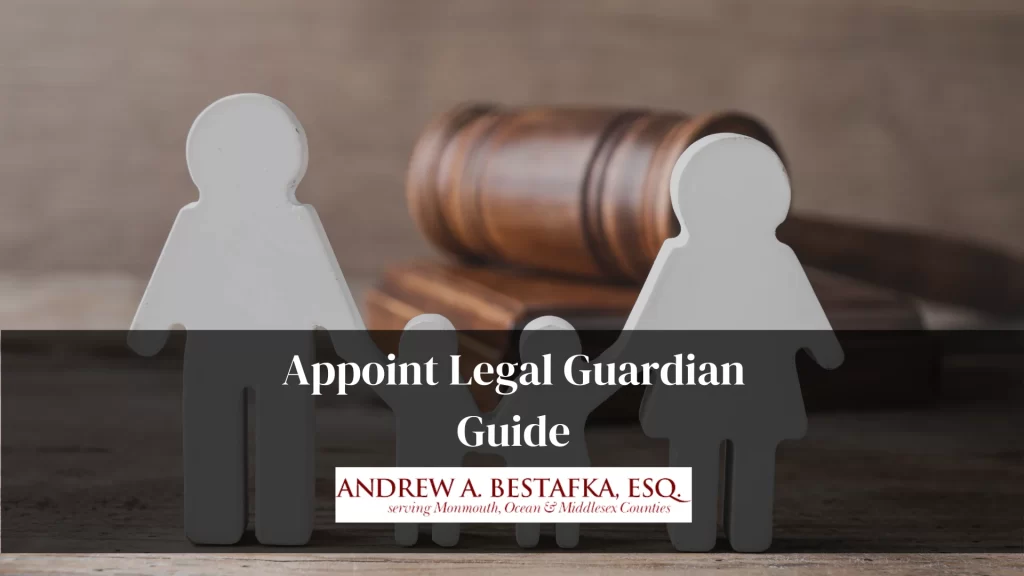
If you are wondering “how to appoint a legal guardian,” call The Law Office of Andrew A. Bestafka, Esq. today. We can assist with all types of guardianship issues as families and caregivers seek to protect their loved ones through guardianship. Whether for elderly or incapacitated family members or minor children, we are here to guide you through the process. Contact us today for a confidential consultation.
What Is Legal Guardian?
“A guardian is a person or agency that is legally authorized to act on behalf of a minor or an incapacitated adult to assure that the person’s health, safety, and welfare needs are met and that his or her rights are protected.” As a guardian, you will make legal decisions on behalf of the individual, known as the ward. However, you can (and are usually encouraged) to involve the person in certain decisions if their mental abilities permit it. A guardian of the person makes decisions about the ward’s well-being, such as where they will live, go to school, and what medical care they will receive. A guardian of the estate has control over the ward’s assets and business dealings. One person can perform both guardianship roles.
How Long Does Legal Guardianship Last?
How long a guardianship lasts depends on the terms of the guardianship. Once a guardianship is established, it typically terminates if the ward regains capacity (in conjunction with a court order) or upon their death. When the guardianship terminates, the guardian may take no further action.
However, you can establish a temporary guardianship. You can request temporary guardianship for an adult if they have a physical or mental disability and you believe they are incapable of making their own decisions. However, temporary guardianship can only be requested if an application for general guardianship is pending before the court. Further, emergency circumstances must exist such that there is a critical need to protect the individual from substantial harm to themselves, their property, or their business affairs.
Because everyone’s circumstances are different, it is critical to work with a guardianship lawyer to ensure the guardianship you need is appropriately structured and tailored to your circumstances. Guardianship is often a last resort because the ward loses a significant number of legal rights. As such, your attorney may advise you that limited guardianship rather than general guardianship is best for your circumstances.
Can a Guardian Sign Legal Documents?
Yes, a guardian can sign legal documents on behalf of the ward. Because of the ward’s incapacity (and the fact that their right to dictate their affairs is taken away through guardianship), this is a right and responsibility of the guardian as the advocate for the ward. The guardian will likely sign in their capacity as guardian when signing any legal documents on behalf of the ward. They will also likely sign consents for medical treatment for the ward as guardian. Because of the medical and other decisions the guardian makes for the ward, they must demonstrate that they have the ward’s best interests in mind.
How Old Is a Legal Guardian?
A guardian must be at least 18 years old. However, this is only a minimum requirement. To qualify as a guardian, the individual must also have “standing,” meaning some relationship with the proposed ward, such as a spouse, family member, adult child, or professional guardian. For example, if one spouse becomes incapacitated, the other spouse may become their guardian. Or a parent may become a guardian of their incapacitated adult child.
What Responsibilities Do Legal Guardians Have?

Under New Jersey law, a legal guardian makes all the legal decisions for the ward. The guardian must pay the ward’s bills, manage their personal property, determine where they will live, and make all medical decisions. The guardian must trust and always consider the ward’s best interests because they can dictate how the ward’s money is spent, who the ward can associate with, and whether they take the prescribed medication.
In other words, the guardian has broad power over the ward to make decisions concerning their everyday life, including personal care, housing, medical care, and even meals. The guardian controls the ward’s finances and manages their assets and debts. Because of their control over the ward, courts encourage legal guardians to work with the individual to make joint decisions when possible.
Your attorney may alternatively advise you to establish a living trust or living will instead of a guardianship of the person because those documents would reflect the individual’s wishes for their medical decisions.
Call The Law Office of Andrew A. Bestafka, Esq. If You Are Considering Guardianship
At The Law Office of Andrew A. Bestafka, Esq., we understand that pursuing guardianship, while necessary, maybe an emotional experience. We dedicate ourselves to helping families in their time of need and are here to answer any questions you have. Let an experienced guardianship attorney lead you through the guardianship process. Call us today at (732) 898-2378 to get started.
Related Posts:
